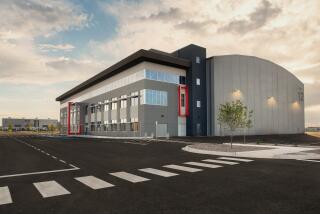Landmark to Upgrade to Digital Theaters
- Share via
Landmark Theaters Inc., the nation’s largest independent movie theater chain, cut a deal Thursday to install a digital movie projection system based on Microsoft Corp.’s Windows software in its 53 theaters nationwide.
The win is a modest one for Microsoft, which has yet to persuade mainstream theater chains to adopt its technology. Part of the problem is that its Windows Media 9 software does not offer the film resolution needed to project crystal-clear images on large screens.
But Bert Manzari, executive vice president of film and marketing for Los Angeles-based Landmark, said independent filmmakers will appreciate the system because it will help them stretch their production budgets by eliminating the need for expensive film prints.
“We live in the world of smaller screens, and we see that there will be real significant savings to be incurred by using this technology for smaller films,” he said.
Landmark plans to roll out the systems in the next three months and have them installed in the projection booths for each of its 177 screens by December.
Privately held Landmark declined to say how much it is spending on the retrofit.
The deal, made as an industry consortium is still wrestling to establish uniform technology standards, underscores the eagerness of exhibitors to embrace a future without film.
“We don’t want to wait while the technical standards [are] still being debated,” Manzari said.
The system will combine digital projectors, computer hardware, networking equipment and software assembled by Digital Cinema Solution, a Los Angeles company that relies on off-the-shelf PCs and Microsoft software. A complete system for a single screen costs from $50,000 to $80,000, according to DCS executives.
That’s a fraction of what it typically costs to upgrade a theater for digital cinema.
Digital projection systems promise to rid movies of visual problems, including wear on celluloid prints and on-screen flaws caused by mechanical projectors. And by eliminating film, studios expect to save hundreds of millions of dollars in print production and distribution costs.
Still, the conversion costs are considerable. One of the biggest roadblocks has been determining who will pick up the $150,000 tab for each high-end digital projector, let alone the costs tied to computers, networking equipment and other necessary technology.
Kansas City, Mo.-based AMC Entertainment Inc. has bought a handful of such digital projectors and installed them in some of its top-market theaters. Regal Entertainment Group, the nation’s largest movie theater chain, is spending an initial $70 million to retrofit nearly 80% of its 524 locations with digital projectors, high-speed data-networking equipment and satellite links by the end of this year. So far, the Knoxville, Tenn., company has upgraded 2,300 screens in 200 of its theaters.
More to Read
The biggest entertainment stories
Get our big stories about Hollywood, film, television, music, arts, culture and more right in your inbox as soon as they publish.
You may occasionally receive promotional content from the Los Angeles Times.










